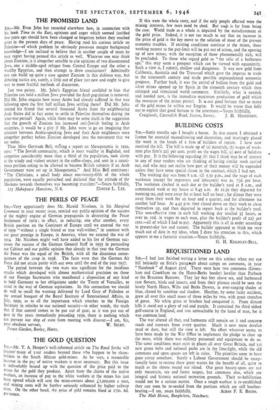THE GOLD QUESTION
SIR,—Mr. T. A. Hooper's well-informed article on The Rand Strike will interest' many of your readers beyond those who happen to be share- holders in the South African gold-mines. As he says, a reasonable increase in the pay of native workers is most necessary. But this issue is .indissolubly bound up with the question of the price paid to the mines for the gold they produce. Apart from the claims of the native Workers, an increase of pay to the white workers at the mines has just been agreed which will cost the mine-owners .about £I,000,000 a year, and mining costs will be further seriously enhanced by higher railway rates. On the other hand, the price of gold remains fixed at 172s. 6d. per ounce. If this were the whole story, and if the only people affected were the mining interests, few tears need be shed. But sucah is far from being the case. World trade as a whole is impaired by the maladjustment of the gold price. Indeed, it is not too much to say that an increase in the price of gold is the key move to the solution of most of the present economic troubles. If existing conditions continue at the mines, those working nearest to the pay-limit will be put out of action, and the opening up of new mines, with the exception of those phenomenally rich, will be precluded. To those who regard gold as "the relic of a barbarous age," this may seem a prospect which can be viewed with equanimity. Such a view is, I submit, shallow and dangerous. It was new gold from California, Australia and the Transvaal which gave the impetus to trade in the nineteenth century and made possible unprecedented economic progress. Further back, it was the arrival of bullion from the gold and silver mines opened up by Spain in the sixteenth century which then enlarged and stimulated world commerce. Similarly, what is needed, and needed now, is the immediate maximum production of gold which the resources of the mines permit. It is our good fortune that so many of the gold mines lie within our Empire. It would be worse than folly not to exploit that good fortune to the uttermost.—Yours faithfully, Craiglands, Cavendish Road, Sutton, Surrey. J. H. HIGGINSON.


























 Previous page
Previous page